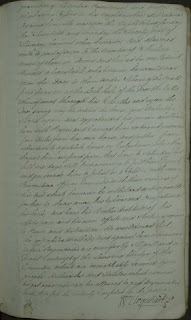Military Impressment in the 18th Century
 February 2008’s highlighted document was an extract from a
Minute Book of the Aberdeenshire Commissioners for Military Impressment,
1756-7 (reference AS/Amil/10/2/1). The extract describes the frightening ordeal of William Henery of the
parish of Towie, when he was apprehended for recruitment early in 1757.
February 2008’s highlighted document was an extract from a
Minute Book of the Aberdeenshire Commissioners for Military Impressment,
1756-7 (reference AS/Amil/10/2/1). The extract describes the frightening ordeal of William Henery of the
parish of Towie, when he was apprehended for recruitment early in 1757.
Previous pages of the volume explain that William Henery had
the misfortune to have fallen out with his neighbours several years before, and
they conspired to have him impressed into the army by the Constables for his
parish. However, he had been released mainly on the grounds that he was
employed as a farmer, and that the farm he shared with his brother would fail,
leaving his brother destitute if he was recruited into the army.
However, as the extract shows, he was apprehended by the
Constables again, and held against his will until the day of the meeting from
which this extract is taken. Ultimately the Commissioners found that a hardship
had taken place and ordered his release from custody and the obligation to
serve in the army.
General Background

The Act appointed various bodies in the counties and cities
of the land to administer and oversee the recruitment process within their
subdivided districts, and in Aberdeenshire, this consisted of the Justices of
the Peace and the Commissioners of Supply (collectors of tax throughout the
County).
The main business of these newly formed Commissions under
the Act was to recruit able-bodied unemployed men of 17-45 years of age from
within the County boundary that had no form of monetary support or maintenance.
As such the business recorded in the minutes generally relates to arrangements
for handing men over to Army officers, and hearing petitions from men against
their impressment. The detail they go into can make them useful for family
historians.
 The business of finding the recruits, however, was delegated
to Parish Officers or Constables who had powers to search their areas for
potential candidates, and apprehend them to be brought before the Impressment
Commissioners of their subdivided District for final assessment as to their
eligibility for service in the army. Images from the Garioch Militia Enrolment Book for 1802/3 are shown above and to the right. As an extra inducement for their trouble
in apprehending these men, the Act allowed for the Officers to be given 20
shillings (£1) for each man recruited. Understandably, there was also potential
for this process to be abused.
The business of finding the recruits, however, was delegated
to Parish Officers or Constables who had powers to search their areas for
potential candidates, and apprehend them to be brought before the Impressment
Commissioners of their subdivided District for final assessment as to their
eligibility for service in the army. Images from the Garioch Militia Enrolment Book for 1802/3 are shown above and to the right. As an extra inducement for their trouble
in apprehending these men, the Act allowed for the Officers to be given 20
shillings (£1) for each man recruited. Understandably, there was also potential
for this process to be abused.
[Originally published as our Document of the Month in February 2008]


Comments
Post a Comment